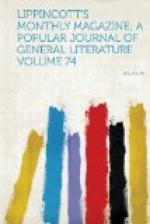I turned away a dozen times, and swore inwardly that I wouldn’t look that way again, and after each resolve I would find my eyes glancing from one person to another in Lu’s vicinity, until finally they would rest again on her. When I had declared for the thirteenth time that I wouldn’t contemplate her heartless flirting, I noticed George bow to some one who had just come in at the gallery door. A young man from one of the western counties was making a satirical speech in favor of the woman’s suffrage amendment, misquoting Tennyson’s “Princess” and making the gallery shake with laughter, at the time; but I noticed George’s face light up and his eyes sparkle with pleasure at the sight of the new-comer. She was a beautiful lady, over thirty, I should say, with the sweetest face, for a sad one, I had ever seen. Of course, in a certain way I like Lucretia’s style of beauty better; but Mrs. Herbert was beautiful in a way, so far as the women I have ever seen are concerned, peculiar to herself. She was rather slender, and had a calm, graceful bearing that I somehow at once associated with purity and nobleness. She was quite simply dressed, and had on a small widow’s bonnet, with the ribbons tied under her chin, while a charming little girl, whose hair curled obstinately over her forehead, had hold of her hand.
I was somewhat surprised—I will not say disappointed exactly—to see her lips break into a glad smile, though it made her face look all the lovelier and sweeter, in reply to George’s greeting; and when she came toward us, as he beckoned her to do, every one immediately and gladly made room for her to pass. Perry and I gave our seats to Mrs. Herbert and her little girl; and I found myself speculating, as I leaned against one of the pillars, on the difference of expression in the eyes of the two, which were otherwise so much alike,—the same deep shade of brown, the same soft look, the same lashes, and yet what a vast difference when one thought of the combined effect of all these similar details. I spoke to Perry of it, and he good-naturedly poked fun at me, saying I was forever trying to see a romance or a history in people’s eyes.
“Well, I suppose you will say she isn’t even lovely,” I exclaimed, with impatience.
“I’m no judge,” he replied, with exasperating carelessness; “but a little too pale, I should say. I wish George hadn’t introduced her to me.”
“Why?”
“Oh, it made me feel cheap to have to back into old Billy Gait’s bony legs and try to bow and shake hands before everybody,—in the eyes of the assembled community, as Charley McWenn would say.”
McWenn was the stupid block of a journalist,—for I do think him a stupid block, in spite of his cleverness,—and I realized then that I had forgotten for a moment all about Lucretia. I could not see her from my new position, so I amused myself by imagining how she was carrying on.




